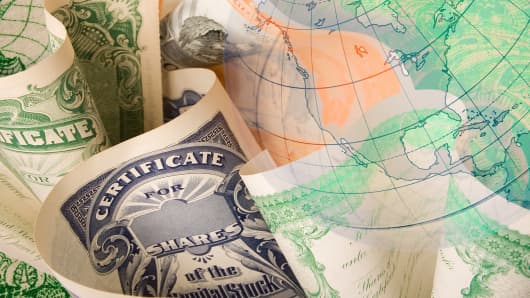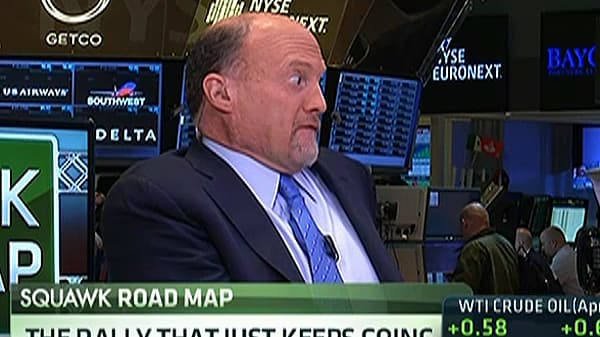While corporate cash gets cited often as one of the strongest positives for economic potential, corporate debt is swelling as well.
Nonfinancial companies added debt at an 8.75 percent pace in the fourth quarter, the biggest jump since 2007, with the majority of debt coming from corporate bonds, according to Fed flow of funds data.
Much of that has come from companies rated below investment grade.
High-yield debt soared to $326 billion in 2012 from $226.3 billion the previous year, according to Thomson Reuters.
In 2013, junk bond volume in the U.S. is at $69.2 billion compared to $78.3 billion for the same period in 2012 - off last-year's record pace but still well ahead of any previous year and more than double what it was at the pre-financial crisis high in 2007.
Globally, high-yield bond issuance stands at a historic mark of $108.5 billion, buoyed by central banks around the world mimicking Fed policy and cutting rates at breakneck pace.
Spreads between junk bond yields and their benchmark measuring sticks are at the lowest since 2007.
(Read More: Cramer: Could the Fed Destroy the Bull Market?)
"Everyone is running out there to raise debt," said Peter Cardillo, chief market economist at Rockwell Global Capital in New York. "Of course the more speculative situations are rising."
Cardillo acknowledges that concerns will grow as the high-yield debt market surges, but believes the likelihood that the Fed will hold rates low for an extended period means the problem of a bubble is still a ways off.
(Read More: CNBC Explains the Federal Reserve)
Goldman Sachs economists forecast this week that the unemployment rate likely won't go below 6.5 percent until 2015, significant because that's what the Fed said it will take before it starts hiking interest rates.
The delay of normalization, though, could only exacerbate a bubble's damage.
"We're keeping companies afloat artificially by the Federal Reserve's cheap money," said economic strategist Michael Pento, head of Pento Portfolio Strategies. "The market isn't being supported by real viable fundamentals."
Stock market bulls use corporate earnings to bolster their case that equities are cheap, but those profits are likely inflated by the influx of debt used to keep companies going.
(Read More: No 'Irrational Exuberance' in Stocks Now: Greenspan)
"People are saying the economy's doing great," Pento said. "They're ignoring the fact that the 'E' in P/E (price to earnings) ratio is artificial. What would the earnings be if the real estate market wasn't being supported by the Fed, if they didn't have access to cheap capital, if the government wasn't able to float this consumption bubble by sending transfer payments out? All of that is engineered by the Federal Reserve and government deficit spending."
At some point, Fed critics say, the central bank will have to grapple with the effects of its interest rate manipulation and the $3 trillion in new money it has created to carry out its policies.
Fed Chairman Ben Bernanke has tried to use monetary policy to substitute for Washington gridlock on enacting economic growth measures, but that can't last forever.
"As debt service goes up it's a very precarious position," Hurley said. "But it all goes back to our not being able to function with both cylinders operating."
—By CNBC's Jeff Cox. Follow him on Twitter @JeffCoxCNBCcom.





